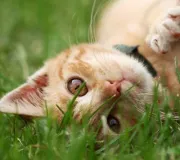Are there paw prints in your yard and drive? Did you know that your canine buddy’s feet need care too? Taking care of your pup’s paws needn’t take up much time, but it’s very important to his overall health. This is one area where an ounce of prevention is worth a pound of cure, as it’s often much easier to prevent paw injuries than to treat them. In this article, your Treasure Coast vet discusses taking care of your dog’s paws.
Seasonal Hazards
Here in Florida, you won’t have to worry about the dangers of snow and ice, but our sunny weather can be very hard on your pup’s feet. Hot sand, tar, and concrete can cause dogs’ paw pads to burn or blister. A good rule of thumb to keep in mind is that if the ground you’re on is too hot for you to walk barefoot on, it’s too hot for your pup. Try to keep your canine buddy on grass and dirt during those scorching summer days. Swimming can also be dangerous to your pooch’s paws. Immersion in water will make your canine buddy’s skin very soft and sensitive, just as it does human skin. Fido is much more likely to get painful blisters or burns on his paws after he’s been in the water.
Pawdicure
Overgrown claws can force Fido into an unnatural gait, and can, over time, contribute to arthritis and other skeletal issues. Trim your canine buddy’s claws regularly. If you’re uneasy doing it yourself, you may want to invest in a clipper with a sensor. These are more expensive, but they indicate exactly where to snip, so you don’t have to worry about cutting too close. You can also schedule a quick nail trim with your vet, or have your groomer give your pooch a ‘pawdicure’.
Toe Care
Keep Fido’s toe fur trimmed back to prevent painful mats and tangles. You’ll also want to check those furry little toes to make sure there are no foreign objects lodged between them.
First Aid
If Fido gets a minor cut or scrape, you can treat it with an antiseptic wash, but take him to the vet immediately for anything more serious. Similarly, if you notice any other unusual symptoms, such as sneezing, which could indicate an allergy or cold, you might find it helpful to check out our article “Help! My Dog Won’t Stop Sneezing” for some guidance on what to do next.
Contact us, your local animal clinic in St. Lucie County, FL!
For more pet care articles, click here.

